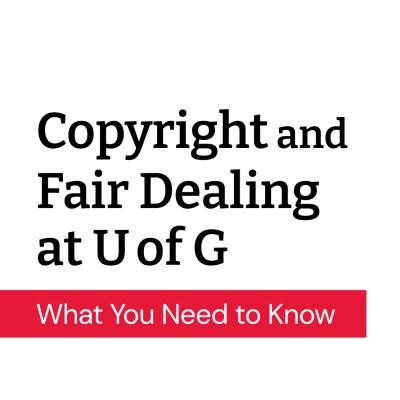
You may or may not realize it, but you’re dealing with copyright daily at U of G. “Whether you’re a faculty member, an instructor, staff, or a student, you probably create works that are subject to copyright protection and also make use of copyrighted materials that have been created by others,” said Heather Martin, U of G’s copyright officer. “So, it’s critical to understand the ways in which copyright may impact your teaching, research, and studies.”
What's particularly important to be aware of is how materials may be reproduced and shared with others for educational purposes without infringing copyright. This article will outline what you need to know about copyright and fair dealing at U of G.
Canadian copyright law and higher ed
Making copies of substantial portions of copyrighted works and communicating them to others is subject to Canadian copyright law and generally requires the permission of the copyright owner. However, some copying is permitted under exceptions in the Copyright Act. One of these exceptions is called fair dealing.
Fair Dealing Guidelines: What are they?
The fair dealing exception in the Canadian Copyright Act permits the copying and communication of protected works to others without permission or payment as long as certain qualifying factors are met. The U of G has adopted the Fair Dealing Guidelines recently updated by Universities Canada, which provide guidance on how the fair dealing exception may apply when copying and sharing works in university settings. The updated Guidelines recognize and acknowledge the outcome of the York v. Access Copyright lawsuit, which affirmed the right of institutions and instructors to make copies on behalf of their students.
What can I copy?
The Fair Dealing Guidelines permit the copying of short excerpts of works, provided the copying is for one of fair dealing’s allowable purposes, which include private study, research, education, criticism and review.
Examples of short excerpts include:
- Up to 10% of a work
- One chapter from a book
- A single article from a periodical issue
- An entire newspaper article or page
- An entire entry from an encyclopedia, dictionary, or similar work
- An entire artistic work (e.g., painting, photograph, diagram, drawing, map, chart) from a work containing other artistic works
The Fair Dealing Guidelines also describe the circumstances in which instructors and others may copy and share short excerpts and outline some best practices for ensuring that copying is fair.
It is important to note that the fair dealing exception allows for some types of copying that are not specifically addressed in the Fair Dealing Guidelines, and that other educational exceptions exist in addition to fair dealing. Also, library licensed e-journals, e-books, and databases permit many types of educational uses.
What can you do?
- Learn about copyright and how it pertains to you. Find more information about Copyright at the University of Guelph.
- If there is printing/copying/scanning equipment in your area, display the updated copyright poster.
- If you’re in the library, you’ll notice the new copyright posters have been placed at each print, copy, and scan station.
- Copyright posters have been distributed across campus and must replace any previous versions. Need a copy? Let us know!
Questions?
Contact us. We’re happy to help.
License

This work is licensed under a Creative Commons Attribution-NonCommercial-ShareAlike 4.0 International License.